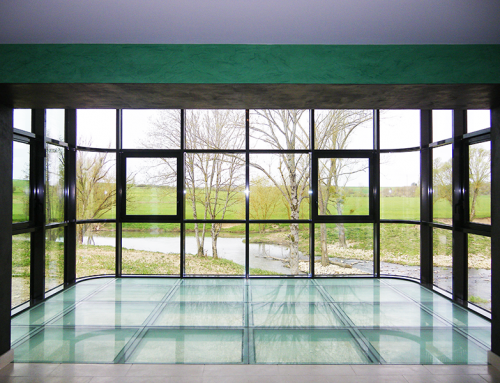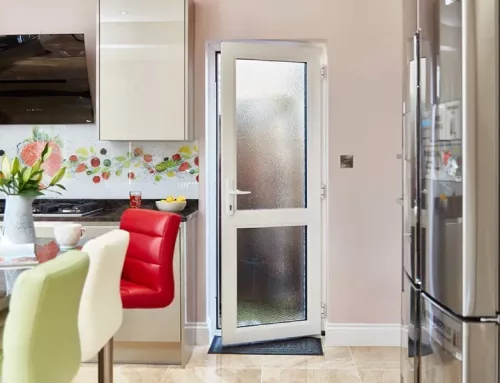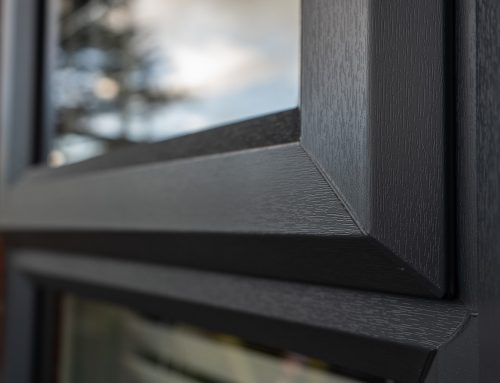uPVC, or Unplasticized Polyvinylchloride, is a common material used in windows and doors, but have you ever considered the benefits of choosing uPVC windows over other products?
Here are a few benefits of uPVC windows and doors in your home:
1. Customizable
One of the benefits of uPVC windows is that they are highly customizable to suit your preferences and style. While traditionally, uPVC windows, doors, and external facias have been available only in white, advancements in the manufacturing process have enabled homeowners to choose from a wide range of colors, shapes, and styles, including wood grain effects that mimic the look of traditional wooden windows.
This customization allows homeowners to tailor uPVC products to their desired specifications, ensuring that windows and doors fit perfectly into their homes or properties. Installation companies and manufacturers can work with homeowners to design and install uPVC windows and doors that not only enhance the aesthetic appeal of the property but also provide superior insulation and energy efficiency.
Choosing uPVC windows and doors in colors and styles that match the existing décor of a home can greatly enhance its overall look and feel. In addition, uPVC’s low-maintenance properties mean that they will continue to look great for years to come with minimal upkeep.
Furthermore, uPVC windows and doors are highly durable and resistant to weathering and rotting, ensuring that they will last for many years without the need for replacement. This makes them a cost-effective choice for homeowners in the long run.
2. Security
Second of the significant benefits of uPVC Windows is their ability to provide top-notch security for your property or home. The security of your home is of utmost importance, and when it comes to windows or door installations, it is a top priority.
uPVC windows are known for their sturdy and durable frames, which are surprisingly lightweight. When combined with various locking combinations and double-glazed panes of glass, uPVC windows provide a high level of security that deters intruders from breaking in. The material used in uPVC windows is strong and resistant to weathering, which means it can withstand harsh conditions, making it an ideal material for homeowners who prioritize safety.
Additionally, uPVC windows come with a range of locking mechanisms, such as shoot-bolt locks, which provide an added layer of security. The double-glazed panes of glass also add an extra layer of security, as they are much harder to break than single panes of glass.
Apart from security, uPVC windows also offer energy efficiency benefits. Their double-glazed panes of glass provide better insulation and soundproofing, which can help reduce energy bills and noise levels. The sturdy frames also help prevent air leakage, reducing heat loss and maintaining a comfortable indoor temperature.
3. Insulation
When it comes to choosing new windows and doors for your home, energy efficiency is a top priority for many homeowners. The materials used in their construction can significantly impact the warmth and energy rating of your home. This is where uPVC windows come in, offering a wide range of benefits for homeowners looking to improve their energy efficiency.
One of the primary benefits of uPVC windows is their low thermal conductivity. When installed correctly, they form a closed air system that minimizes heat loss. Compared to non-insulating materials, uPVC windows offer superior energy efficiency, which can help reduce your heating bills in the long run. Additionally, their energy-efficient properties can also help reduce your carbon footprint and make your home more environmentally friendly.
4. Low Maintenance
When it comes to upgrading the windows and doors in your home, there are many options to choose from. However, uPVC windows and doors have become a popular choice for homeowners due to their many benefits.
One of the most significant advantages of uPVC windows and doors is their low-maintenance properties. Unlike natural materials like wood, which require annual sanding, varnishing, and repainting, uPVC is a synthetic material that requires little to no maintenance. uPVC windows and doors can last for decades without any signs of weathering, making them a practical and cost-effective option for homeowners.
Cleaning uPVC windows and doors is also very easy. A simple wipe down with soapy water is all that is needed to remove dirt and grime and prevent staining. This low-maintenance aspect of uPVC makes it a great choice for busy homeowners who want to enjoy their homes without the hassle of constant upkeep.
In addition to its low-maintenance properties, uPVC is also a durable and weather-resistant material. It is resistant to rot, corrosion, and fading, making it an ideal option for homes in areas with harsh weather conditions. uPVC windows and doors can withstand high winds, heavy rain, and extreme temperatures, providing homeowners with peace of mind knowing their home is well protected.
5. Durability
One of the significant benefits of uPVC windows is their durability. The material is incredibly tough, which means that the frames can withstand even the most extreme weather conditions. Unlike traditional materials such as wood, uPVC windows are not affected by rot and corrosion, making them an ideal choice for properties located near the seaside, where high salt content can be problematic.
Furthermore, uPVC windows are resistant to fading, even in prolonged sun exposure. The UPVC coating used in the manufacturing process is protected against ultraviolet (UV) rays, ensuring that the material retains its color for years to come. This is particularly advantageous for homes that receive a lot of direct sunlight as it ensures that the uPVC frames will maintain their appearance and not fade or discolor over time.
6. Ventilation
When it comes to the benefits of uPVC windows, one major advantage is their versatility in terms of window style configurations. uPVC windows come in a range of styles that can provide an efficient ventilation system and effective airflow into a room. The choice of window style can make a significant difference in the comfort and livability of a home.
One popular window style configuration is the ’tilt and turn’ design. This style consists of a two-window arrangement that can open in two separate directions, providing draft-free ventilation. When the window is in the tilted position inwards, hot air can escape through the top and side openings. Turning the window to open fully can quickly ventilate the atmosphere of an entire room, which is useful for cleaning or refreshing.
Aside from ventilation, uPVC windows also offer several other benefits. They are highly durable and long-lasting, requiring minimal maintenance. uPVC is a material that is resistant to weathering, rot, and corrosion, making it ideal for windows that need to withstand harsh elements. uPVC windows are also energy-efficient, as they are designed to minimize heat loss, resulting in lower energy bills.
7. Eco-Friendly
The benefits of uPVC windows extend beyond their thermal efficiency and low-maintenance properties. With a life span of 40-80 years, these windows are built to last, making them a cost-effective investment for homeowners.
Furthermore, uPVC is a sustainable material that can be recycled and reused in the production of other products such as pipes and plumbing fittings, thereby minimizing its long-term impact on the environment. This means that replacing old windows and doors made from uPVC can contribute to a greener and more sustainable future.
However, it is essential to ensure that the old uPVC windows and doors are disposed of properly by asking the installer to recycle them. By doing so, the materials can be reused and kept out of landfills, reducing the environmental impact further.
8. Weather Resistant
One of the many benefits of uPVC windows and doors is their ability to withstand weathering. Unlike traditional materials such as wood or metal, uPVC does not react with water and air, making it highly resistant to the natural elements.
This means that uPVC windows and doors have a longer lifespan and do not age as quickly as other materials. They are less likely to crack, fade, or rot over time, ensuring that they maintain their appearance and functionality for many years to come.
However, while uPVC is highly durable and requires less maintenance than other materials, regular care is still recommended to ensure its longevity. This includes cleaning any external uPVC installations such as soffits and fascias to prevent the build-up of dirt, debris, and grime, which can lead to discoloration and deterioration over time.
9. Soundproofing
One of the significant benefits of uPVC windows is their ability to reduce external noise. The combination of uPVC material and double-glazed window panels works together to create an effective noise barrier that can significantly decrease the amount of noise that can pass into your home.
UPVC windows and doors are well-known for their soundproofing capabilities, which can reduce external noise levels by up to 50% compared to traditional window materials. This makes uPVC windows a popular choice for homeowners who live in noisy urban areas or near busy roads.
The soundproofing benefits of uPVC windows come from their design and construction. The double-glazed window panels create an air gap that acts as an additional barrier to sound waves. The uPVC frames also help to reduce noise by absorbing sound waves and preventing them from passing through the frame and into your home.
10. Fire retardant
When it comes to choosing materials for windows and doors, fire safety is an essential consideration. Building regulations require that units and frames for windows and doors must be made from fire-rated materials that prevent external fire spread.
Fortunately, uPVC is a material that adheres to the fire safety protocol and is classified as a fire-rated material. In the event of a fire incident, uPVC windows and doors will keep the primary escape route open for at least 30 minutes, providing valuable time for people to evacuate the building safely.



